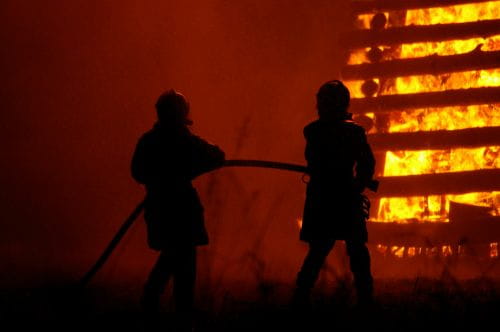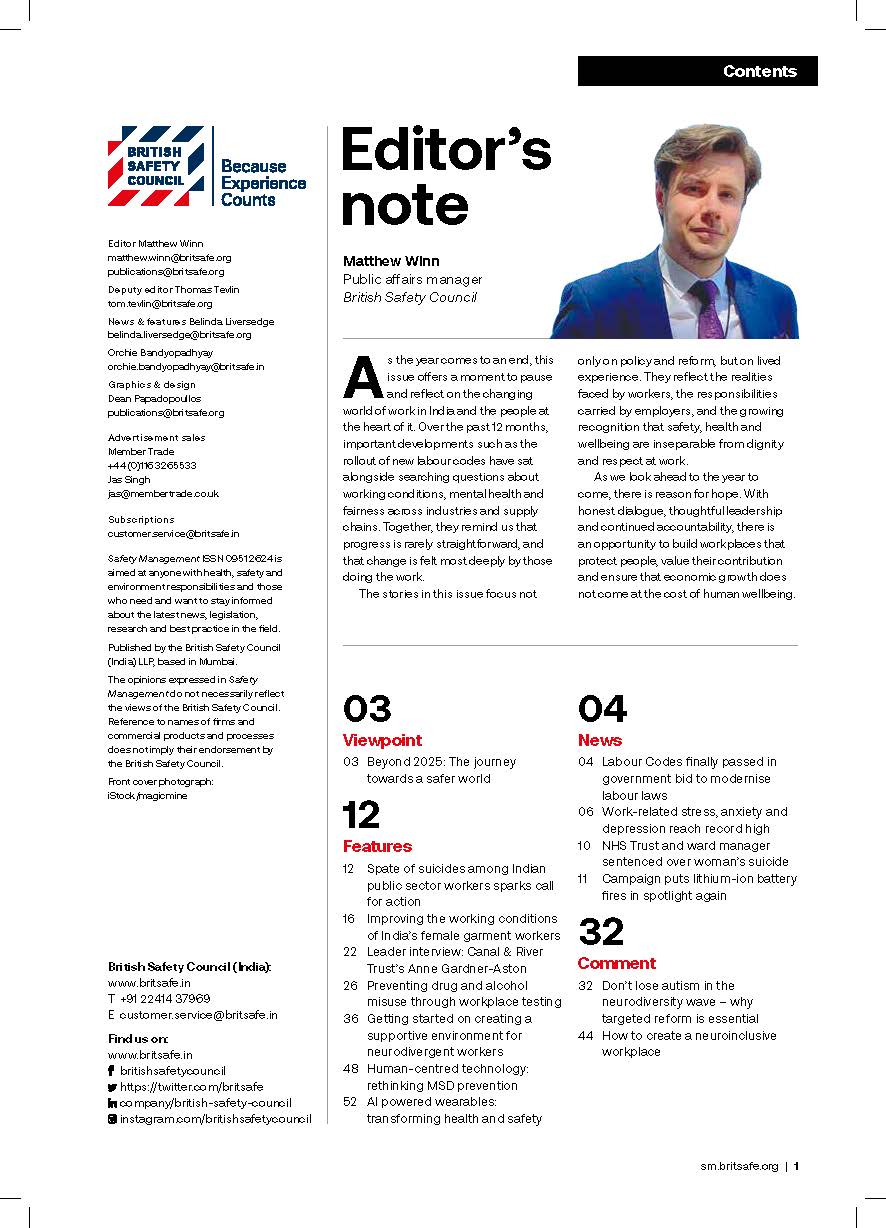Although Assam’s state government recently announced a pay rise for workers in state-run tea plantations, trade unions say the industry’s workforce still faces poor working and living conditions, despite years of protests and demands for improvements.
Features
Assam’s tea gardens: the battle for decent working conditions continues
On 21 May 2025, International Tea Day, Assam’s chief minister Himanta Biswa Sarma announced that daily wages for workers in state‑run tea gardens under the control of Assam Tea Corporation Ltd (ATCL) will increase from Rs 220 to Rs 250 per day, effective from 1 October 2025.
The hike in wages, though modest, is coupled with welfare measures, including a one-time aid payment of Rs 5,000 to over seven lakh workers. Although tea garden workers and activists say the wage increase and one-off grant is a step in the right direction, they warn it falls short of meeting their long-standing demands for better wages and improved working conditions.

A report by the Comptroller and Auditor General of India found that the wages of tea garden workers in Assam are “meagre”, with “several shortcomings and areas of concern” in implementation of labour laws and worker welfare provisions.
Tea plantation workers in Assam typically begin their day at dawn. Although men primarily work in the factories where the tea is processed and packed for shipping, women form the backbone of the picking workforce in the tea growing gardens. Come rain or shine, they are on their feet for eight to 10 hours meticulously plucking the leaf sets of two leaves and a bud from each bush. With baskets tied to their heads, they tirelessly pluck leaves to meet the daily target of picking 24–26 kilogrammes.
“I have heard that our chief minister has pushed up our wages to Rs 250 per day. But, with food and oil prices going through the roof, the wages are not enough to feed my family,” said tea garden worker Rani Das, who is the sole earner for her family of five.
When asked about the various government welfare schemes available to tea plantation workers, she said children of workers like herself are deprived of a quality education even though children aged six to 14 were granted the right to free and compulsory by the Union Government through the Right to Education Act in 2009.
“Tea garden managements do not encourage education as they require workers to pluck leaves,” she said. “They want to exploit us and our children forever. The management know that if our children are educated, they will never work as tea pluckers for such low wages. They will raise their voice and protest.
“Both my children dropped out of school four years ago and started working in the plantation to make ends meet. But they wanted to study so I sent them to live with my parents in North Bengal. Now they are going to school daily.”
Low wages
Rani added that although her wages are paid on time and she is entitled to certain welfare benefits, such as a regular food ration payment and employer contributions towards her personal provident (pension) fund, many tea plantation workers – especially in the unorganised sector – are paid lower wages and do not receive any benefits. “Sometimes they receive their pay after two months,” she said.
Although the Assam government’s move means the salaries of ATCL workers are now on a par with those of workers employed in private tea gardens in the Brahmaputra Valley – who have earned Rs 250 since October 2023 – wages among the state’s tea picking workers remain far from equitable. In the Barak Valley, tea garden workers are paid Rs 228 per day, while workers in tea gardens in the unorganised sector only earn somewhere between Rs 150 and 180.
Minimum legal standards
The Plantations Labour Act 1951 sets and regulates minimum standards for the working and living conditions of tea plantation workers. The Act applies to plantations that cultivate tea, coffee, rubber, cinchona or cardamom, and cover an area of five hectares or more, employing at least 15 workers.
The Act specifies minimum standards for healthcare and welfare, sanitation facilities, maximum working hours, leave days and salaries for plantation workers. It also mandates that plantation management provide medical facilities, recreational and educational opportunities and housing for workers and their families.
However, commentators say there is a stark gap between the provisions of the legislation and the working and living conditions of people employed in plantations.
“Heavy rainfall, thunderstorms and hailstorms affect our health as we have to work in waterlogged tea gardens,” says Sona Devi, a 35-year-old worker. “Lack of access to safe drinking water aggravates the situation as most of us drink water from unprotected ponds and water bodies that we also use for cleaning purposes and other household activities. This makes us prone to many illnesses such as cholera, dysentery, diarrhoea and more”
Sona adds that tea estate hospitals lack specialist doctors and tertiary care, and are generally based in remote rural locations, so workers with medical problems are forced to travel long distances to town and cities for treatment. “But, we want close access to healthcare and a quick remedy as we cannot afford to miss out on work and lose a day’s pay,” she says.
Life-threatening fungal infection
Meanwhile, in a worrying development, a new research paper by Assam Medical College and Hospital (AMCH) has identified a life-threatening fungal infection that occurs mainly in the damaged lungs of tuberculosis survivors who are current or former tea plantation workers in Assam. The study highlights an alarming suspected link between tuberculosis (TB) and Chronic Pulmonary Aspergillosis (CPA), which is disproportionately affecting tea garden workers in the region.
CPA is a long-term lung infection caused by the fungus Aspergillus, which typically affects people with pre-existing lung conditions. It is characterised by the development of cavities in the lungs, sometimes containing fungal balls (aspergillomas). CPA can lead to significant lung damage and respiratory problems, with potential for serious complications if left untreated.
The research team observed that respiratory diseases not only reduce the productivity of tea planation workers but also push families into cycles of debt as they face high expenses for medical treatment and a loss of income because they are often unable to work due the symptoms of CPA.
The team say local healthcare providers should be trained to recognise the symptoms of CPA so the lung condition can be detected at an early stage and educating workers on the symptoms of poor respiratory health and the importance of nutrition and hygiene in helping to prevent respiratory conditions and diseases.
Call for land ownership rights
Meanwhile, as well as raising concerns about risks to their health and problems ensuring their children receive a suitable education, tea picking workers also say they should be granted land ownership rights, arguing that many families have lived on tea estate land for generations without being granted legal deeds giving them a formal right to own and live on a portion of the land.
“We’ve been here for decades, yet we have no papers to prove it. The government must grant us land deeds,” one worker urged.
Another pressing concern is housing support for workers who live outside the estates.
Workers who live outside the estates say the monthly housing rent allowance for accommodation outside the estate should be increased from Rs 300 to Rs 1,000. “We need this [allowance] revised to at least Rs 1,000 to keep up with rising rents,” said one plantation worker.
The Assam Chah Mazdoor Sangha (ACMS), the largest tea workers’ union, has repeatedly demanded a minimum daily wage of Rs 351. In March, ACMS president Paban Singh Ghatowar refuted the Assam state government’s claim that there were no wage-related demands. He emphasised that the union had submitted multiple memoranda urging a hike that would allow workers a dignified livelihood.
Meanwhile, commentators say that although crimes such as domestic violence, human trafficking, sexual abuse and dowry deaths against women and girls are prevalent in tea gardens, there is hardly any reporting of these incidents. “In the face of deprivation, everything else [such as crimes against female tea workers] is often pushed into the shadows,” said an ACMS leader.
Assam produces nearly 700 million kilogrammes of tea annually, of which 140 million kg are exported, and the state accounts for around half of India’s overall tea production. Official statistics show that India earned Rs 6,386 crore from tea exports in 2022–23, with Assam contributing a sizeable share of this income.
Data released by the Tea Board of India shows that India exported 254 million kg of tea in 2024, making it now the second-highest tea exporter in the world.
The tea industry is deeply woven into Assam’s fabric and the state’s tea tribe or Adivasi community, who form around seven million of the state’s total population of 31.2 million, has been the backbone of the globally famed Assam tea for more than 200 years.
However, campaigners argue that the profits generated by Assam’s tea production have never trickled down to the industry’s workers.
During the colonial era, the Adivasis were forced by the British to migrate from central India and work as indentured labourers in the Assam tea plantations. Most of the major Adivasi tribes in the north-eastern state of Assam, including the Oraon, Munda, Kharia, Santhal, Gorh, Ho, Saora and Bhil, continue to live inside tea gardens, where many lack adequate housing, appropriate sanitation, suitable drinking water and other basic amenities.
Occupational dangers
Workers in tea plantations, like those in many other industries, face a variety of occupational dangers. The greatest threats are exposure to biological and chemical agents, including pesticides sprayed on the tree plants, and adverse working conditions, such as long working hours.
On 23 June 2025, an overloaded vehicle transporting raw tea leaves and plantation workers veered out of control and overturned at the Kotalgoorie Tea Estate in Jorhat, 300 kilometres from Asam’s capital city Guwahati. The fatal accident left one worker dead and five others seriously injured, igniting protests as workers blamed the estate authorities for failing to tackle unsafe working conditions and an absence of suitable and safe infrastructure.
Maheshwar Gowala, president of the Jorhat Tea Labour Union, told news reporters that although he didn’t witness the accident first-hand, information from workers present at the scene revealed that the overloaded vehicle had skidded near a drain.
“Four workers managed to jump off, but one unfortunately fell and was crushed under the weight of sacks filled with tea leaves,” said Gowala. He added that the vehicle involved in the accident was old and not suitable for transporting heavy loads. “The vehicle was clearly too old to be in service. We will conduct a thorough investigation, and if the management is found at fault, we will demand justice and compensation for the affected workers,” he added.
Negligence ‘is common’
Trade unions representing tea workers say negligence remains far too common on Assam’s tea estates, with numerous instances of outdated machinery remaining in use despite it posing a known safety risk and safety protocols often being ignored.
Safety standards in tea plantations made national headlines in summer 2022, after a 24-year-old female worker, Moina Nayak, suffered horrific injuries when her hair became caught in a crush, tear and curl (CTC) machine while she was sweeping residual tea leaves that had fallen to the floor from the machine at a tea factory in Assam. The machine, which crushes, tears and cuts tea leaves, ripped the hair and skin from her scalp. It subsequently emerged that Moina had not been provided with any safety equipment, like a helmet, which might have mitigated her injuries.
Moina’s employer, the Dibrugarh’s Lepetkata Tea Estate, owned by Luxmi Tea Company Private Ltd, reportedly paid her compensation of Rs 13.41 lakh following the incident. However, because she was only employed for six months of the year at the tea factory, she does not have access to benefits like a provident (pension) fund to provide a pension and social security payments if she is unable to work, since her employer was not required to make the necessary payments into the government-run provident fund due to the part-time nature of her employment.
In a post on X (formerly Twitter), posted shortly after the incident, Ripun Bora, Indian National Congress Party leader for Assam, wrote: “What happened to MOINA NAYAK at Lepetkata tea factory in Dibrugarh is very tragic. The little girl is now fighting to the death. @mygovassam should ensure a high level enquiry and make necessary arrangements for better treatment, also compensate the family.”
Within days of the accident, the Assam government’s Labour Welfare Department suspended a senior labour inspector responsible for checking safety standards at the Lepetkata Tea Estate factory for alleged negligence in their enforcement and inspection duties.
According to media reports, after the manager of the tea estate provided Moina’s family with money for her medical treatment and the compensation payment of Rs 13.41 lakh, the family decided not to file a complaint to the police over the incident.
Moina was discharged the hospital in February 2023, after a stay of seven months undergoing treatment for the horrific injuries to her head and skin.
Meanwhile, in a separate incident at a different tea factory in December 2020, which was also widely reported in the media, 27-year-old Rima Manki was killed when her sari became caught in a CTC machine. Like Moina,
Rimi was also sweeping up tea leave residue from the CTC machine. She died instantly after her head was pulled into the machine.
Following her death, there were widespread demands from tea plantation workers for tea estate managers across India to provide suitable safety equipment for workers who operate or work near CTC machines, to reduce the risk of entanglement. However, trade unions say that while the management of many tea gardens promised to introduce the necessary safety equipment following the adverse media publicity that arose following Rima’s tragic death, in reality safety improvements in the industry have been minimal.
FEATURES

India’s 10-minute delivery model: why working conditions could be about to improve
By Orchie Bandyopadhyay on 13 February 2026
India’s ‘10-minute’ quick-commerce home delivery model has been criticised for allegedly encouraging reckless riding by delivery workers, but the Government has now reportedly stepped in to urge the app platforms to abandon the time-bound delivery promise and do more to ensure the safety of the sector’s workers.

Migrant workers: Goa fire tragedy reignites debate on poor safety protections
By Orchie Bandyopadhyay on 13 February 2026
A deadly fire at a nightclub in Goa that claimed the lives of 20 migrant workers from across India made global headlines – and triggered fresh demands for government agencies to step up efforts to ensure the safety of low-paid workers in environments such as bars, nightclubs and hotels.




